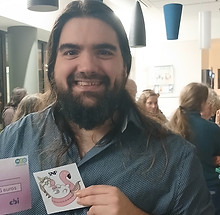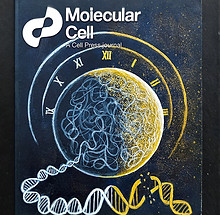
Research Interests
LATEST NEWS
Congrats to Laure Guitton-Sert !

August 2025
Laure Guitton-Sert (former post-doc in our team) has been recruited as a lecturer ("maîtresse de conférence") at the University of Toulouse. She will join to Didier Trouche's team at the CBI.
Congrats to Sebastien!

December 2025
Sebastien defended his PhD on December 12th, on the identification of SNPs that alter DSB frequency. Congrats!!
"Face Cam"
August 2025
Our local CNRS branch, made a short video in which Gaëlle explains our recent findings and the impact it could generate for medical research.
Congrats to Benjamin!

November 2025
The article from Benjamin Le Bozec, former PhD student, supervized by Nadine is out in Mol Cell! In this work, we show that DSB in active loci (TC-DSB) can relocate to the nucelar periphery in human cells, for homologous recombination repair, and that this is under the control of the cirdadian clock.
When RNA gets involved in DSB repair
July 2025
CNRS biologie highlighted our recenlty published article with content tailored for the general public.
Welcome to Rima

October 2025
Rima Kochman is starting a postdoc in the lab. She obtained a fellowship from the ARC foundation. Welcome to her!
Time to celebrate

July 2025
It has been a while since we had gathered all together! We had many things to celebrate! So it was a good excuse to organize a BBQ party.
RECENT ARTICLES
November 2025
This article in Mol Cell shows that, as persistent breaks in yeast, or heterochromatic breaks in drosophila, some DSBs (TC-DSBs, induced in active loci) can reloacte to the nuclear periphery in human cells. At the nuclear enveloppe they are anchored via a protein of the LINC complex, Sun1 but not via Sun2. This process is under the control of PERIOD proteins, that are key factors ensuring circadian oscillations, and we report that consequently, TC-DSB repair is regulated by the cirdadian clock.
May 2025
This article in Nature Cell Biology shows that RNA:DNA hybrids, rather than R-loops, are stabilized at DSBs. Moreover, their formation results from the asymmetric hybridization of pre-existing RNA to the non-resected DNA strand as a consequence of transcriptional repression.
October 2023
This article Nature shows that a novel chromatin compartment forms in response to DSB induction.





